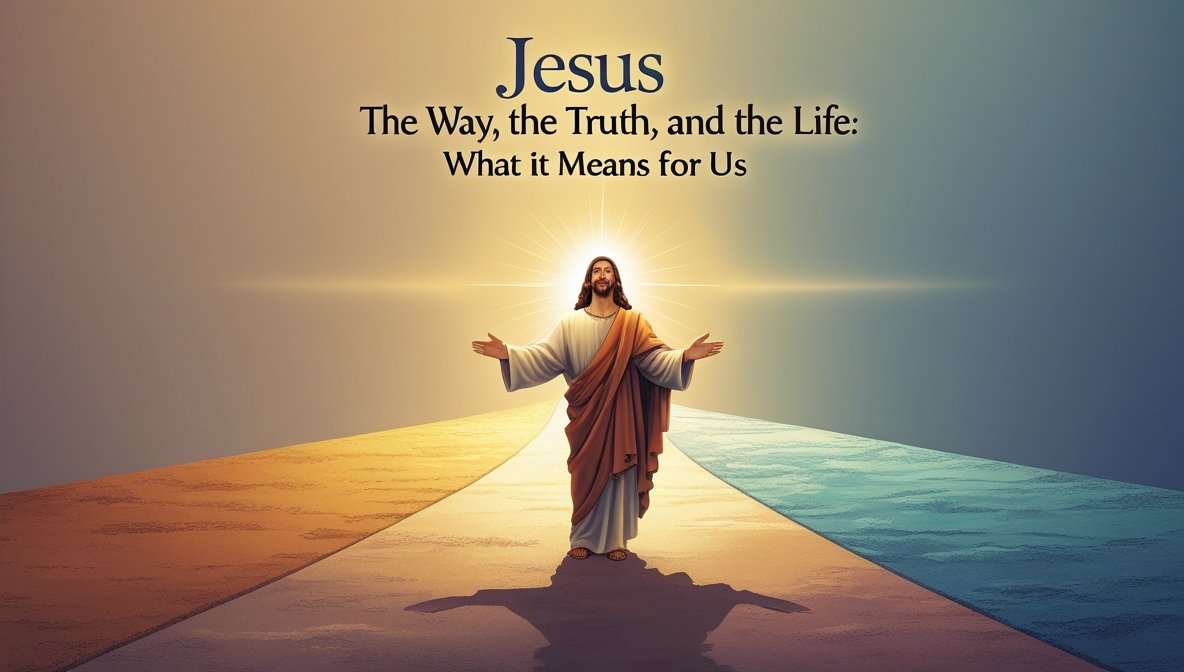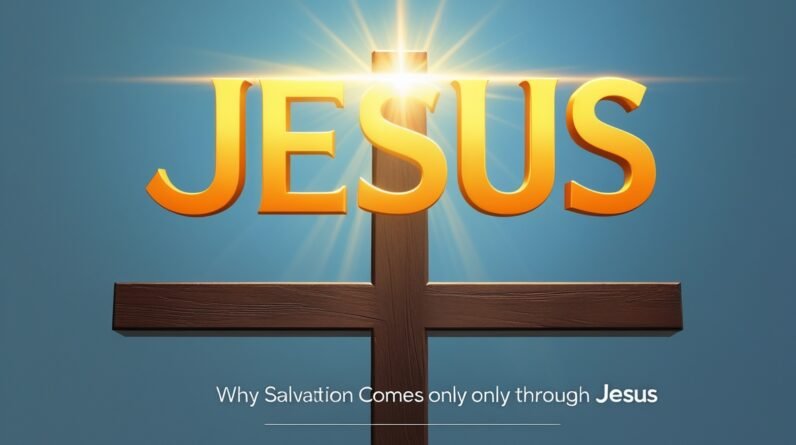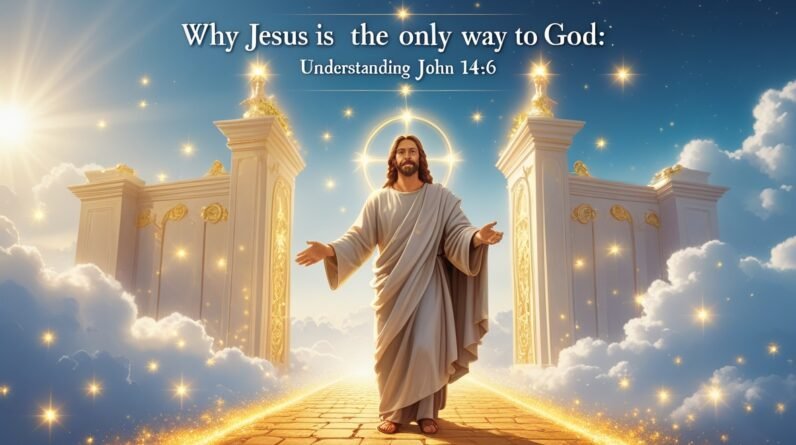Jesus: The Way, The Truth, And The Life: What It Means For You
When Jesus spoke the words recorded in John 14:6, He wasn’t offering a slogan or a clever line. He was opening the door to a relationship that changes everything. Those words—”I am the way and the truth and the life”—are as simple as they are profound, and they carry the power to direct your steps, steady your doubts, and satisfy the deepest longings of your heart. If you’ve ever wondered what “Jesus the way, the truth, the life” really means for you, this article walks through the sentence phrase by phrase, looks at the context in Scripture, and shows practical ways you can live in light of it today.
Read the verse in context here: John 14:1-7 and the verse itself here: John 14:6.
The Setting: Comfort in Troubled Times
Jesus spoke, “I am the way and the truth and the life,” in a moment of great tension. He was preparing His disciples for His imminent arrest and crucifixion. Their hearts were heavy, fear and confusion were in the room, and they needed reassurance.
In John 14, Jesus begins to comfort them, saying, “Do not let your hearts be troubled” and urging them to trust in God and in Him. See the whole passage here: John 14:1-7. Jesus is not only addressing the original disciples; He is speaking to you through Scripture. When life shakes you, His words remain a solid anchor.
Phrase-by-Phrase: “I Am the Way”
When Jesus says, “I am the way,” He isn’t talking about a philosophy or a set of steps you can memorize and perform. He is declaring that He Himself is the path by which you come to the Father. He is the bridge between God and humanity.
Look at how Jesus framed this language elsewhere. He said, “I am the door; if anyone enters through Me, he will be saved” in the same Gospel: John 10:7-9. The image is personal and relational. You don’t follow generic instructions to reach God; you follow a Person.
The apostles affirmed that salvation is found in no one else. Peter said it plainly in Acts: “Salvation is found in no one else, for there is no other name under heaven given to mankind by which we must be saved” (Acts 4:12). This conviction is not narrowness for the sake of exclusion; it’s the announcement of a rescued way home, made possible through the life, death, and resurrection of Jesus.
Practically, when you see Jesus as the way, your posture changes. You stop scrambling for self-help fixes, moral achievements, or religious observances as the ultimate route to God. Instead, you come to Jesus, trusting that He provides access to the Father. The author of Hebrews captures this when he writes that Jesus opened a new and living way through the curtain—the way into God’s presence (see Hebrews 10:19-20). That openness invites you to approach God with confidence because of Christ.
Context for “Way”: The God Who Reaches Out
The Bible is full of images of God making a way when there seems to be no way. In the Exodus, God made a way through the Red Sea for a fleeing people; centuries later, Christ made the ultimate way—reconciliation with God—through Himself. The promise “I am the way” resonates with the constant theme of divine initiative: God reaches out first.
John’s Gospel opens with Jesus as the Word who became flesh, bringing life and light (see John 1:1-4). That Word didn’t merely instruct from a distance; He entered human history to be the bridge. For you, this means God didn’t leave you to work your way back to Him—He came down to show you the way back.
Phrase-by-Phrase: “I Am the Truth”
When Jesus calls Himself “the truth,” He is not claiming to be part truth or a better version of truth. He is claiming to be the very reality of which all true things are reflections. Truth here is personal and trustworthy; it’s not just correct information but the faithful character and revelation of God Himself.
Jesus elsewhere says, “I am the light of the world” (John 8:12). Light exposes, illuminates, and makes things visible. So does truth. The truth of Jesus exposes what sin is, shows what God is like, and reveals how you can be reconciled to Him. You find in Jesus the final explanation of who God is and what life was meant to be.
The Bible also warns that in a world of shifting opinions, truth is non-negotiable. In a culture where everyone claims a piece of truth, the claim that Jesus is the truth anchors you to an objective reality rooted in a loving God. When you trust Jesus as truth, you accept that His words carry authority—not to control you harshly, but to point you to the fullness of life He brings.
Look at John again for a witness to this: “You will know the truth, and the truth will set you free” (John 8:32). This freedom is not mere intellectual assent; it is liberation from the power of sin and the slavery of spiritual blindness. Embracing Jesus as truth changes both your mind and your life.
The Authority of Jesus’ Truth
Truth claims require authority to matter. Jesus’ claim to be the truth finds validation in His life, miracles, teachings, and especially in His resurrection. The resurrection is the divine “Amen” to His claims—God affirming in power that Jesus is who He said He was. Paul writes that Christ’s resurrection inaugurates a new reality, one that secures your hope and your faith (see Romans 1:4).
So when you call Jesus “the truth,” you’re not adopting a metaphysical abstraction; you’re embracing a Person whose words and actions align with the nature of God and whose resurrection validates His words. Your faith rests on a living, risen Savior who embodies truth.
Phrase-by-Phrase: “I Am the Life”
When Jesus says “I am the life,” He offers not just existence but abundant life—woven with meaning, purpose, and eternal hope. Life in Christ is not merely biological animation; it’s spiritual vitality, resurrection power, and relationship with God.
Jesus told Martha, “I am the resurrection and the life. The one who believes in me will live, even though they die” (John 11:25). This statement came after He raised Lazarus from the dead, showing that He has power over death itself. For you, that means that death is not the final word if you are in Christ; there is life beyond the grave grounded in Him.
In John 6, Jesus also declares Himself the bread of life: “Whoever comes to me will never go hungry, and whoever believes in me will never be thirsty” (John 6:35). That picture of satisfying, sustaining life is an apt companion to the phrase “I am the life.” Jesus feeds your soul, heals your wounds, and offers an inner vitality that circumstances cannot fully destroy.
Eternal and Present Life
When Scripture talks about life in Jesus, it speaks of both a present reality and a future hope. You experience new life now—freedom from the bondage of sin, a new identity, and a growing capacity to love and serve. But there’s also the promise of eternal life: future resurrection and unbroken fellowship with God. John summarizes this hope: “And this is the testimony: God has given us eternal life, and this life is in his Son” (1 John 5:11). This is the good news you can hold onto when life is hard and the promise that death will not have the last word.
“No One Comes to the Father Except Through Me”
The second half of John 14:6 sharpens the claim. Jesus doesn’t merely offer one of many possible routes; He declares Himself the exclusive mediator between God and humanity. That exclusivity can sound controversial, but it’s the outworking of God’s mercy: a way has been made, and it is centered in Jesus.
The early church proclaimed this same exclusive hope. Peter and John affirmed that salvation is in Jesus alone (Acts 4:12). And Paul insisted that salvation is by grace through faith, not by works of the Law, highlighting that the way to God is not achieved by human effort but received by trust in Christ (Ephesians 2:8-9).
For you, this exclusivity is not an invitation to pride but to humble dependence. It means you cannot earn your place with God by being good enough; you must receive the gift of forgiveness and reconciliation offered in Jesus. When you accept that gift, you come into the presence of the Father through the living intermediary, Jesus Christ.

Why These Claims Matter for Your Daily Life
Understanding “Jesus the way, the truth, and the life” is more than doctrinal correctness; it transforms how you think, act, and hope. If Jesus is the way, you will orient your life around following Him. If Jesus is the truth, your convictions will be shaped by His revealed reality. If Jesus is the life, you will find your identity and joy in Him.
Practically, this affects how you pray, how you read the Bible, how you handle suffering, and how you relate to others. Prayer becomes a conversation with a Father made accessible through His Son. Scripture is not merely an ancient text but the living word that reveals Jesus. Suffering becomes something you can bear with the presence of the one who conquered death. Relationships become opportunities to live out the love you have received.
Return often to the Gospels to see how Jesus embodies these claims. Reading passages like John 14:1-7, John 8:12, and John 11:25 will deepen your understanding and help the reality of Jesus reshape your life.
How to Respond: Trust, Commit, and Follow
Hearing Jesus say, “I am the way and the truth and the life,” calls for a response. Theologically, that response is faith—trusting in Christ as your Savior and Lord. Practically, it looks like three things: trust, commitment, and follow-up.
First, trust Him. Believe that He is who He says He is and that His sacrifice on the cross paid the price for your sins. The apostle John summarizes the gift of God like this: “God gave us eternal life, and this life is in his Son” (1 John 5:11). Trust grasps that gift.
Second, commit your life to Him. This is not merely a one-time prayer; it’s a turning of your will and heart toward Christ. Romans frames the change this way: you are justified by faith and given new standing before God (Romans 3:23-24). Commitment involves daily surrender and growing obedience.
Third, follow His example. Jesus modeled a life of love, prayer, service, and dependence on the Father. When you follow Him, you become part of His mission to the world. He called the disciples to take up their cross and follow Him; you are no different. That discipline yields the abundant life He promised.
If you’re wondering what to say to God right now, consider a simple, honest prayer: confess your need, ask for forgiveness, thank Him for Jesus, and invite Christ to be your Lord. Countless fellow believers will tell you that this is the moment everything changed. The Bible speaks of repentance and baptism as signs of that turning—practical steps that often accompany a new life in Christ (Acts 2:38).
Objections and Honest Questions
You may have objections: Is this too exclusive? What about good people who haven’t heard? What about doubt? The Scriptures do not shy away from honest questions; they meet them with both truth and grace.
On exclusivity: the Bible’s claim that Jesus is the only way is balanced with God’s mercy and justice. Scripture calls people to proclaim this message to the ends of the earth, trusting God with hearts and eternity (see Matthew 28:18-20). The call to evangelize flows from the urgency of the claim.
On those who haven’t heard: we cannot box God’s mercy into human categories. Scripture urges proclamation and trusts God with the results. Paul’s missionary heart shows that God uses the preaching of Christ to draw people (see Romans 10:14-15). You can be part of that work by praying, supporting the mission, or sharing your faith personally.
On doubt: doubt is often the gateway to deeper faith if you bring it honestly to Jesus. He welcomed questions and met people where they were. Thomas is a picture of honest doubt; Jesus met him with evidence and then with compassion (see John 20:24-29). If you have doubts, bring them to the Lord, to Scripture, and to trusted believers. Doubt need not be the end of your faith; it can be the beginning of a deeper trust.
Living as People Who Know the Way, Truth, and Life
Once you’ve embraced Jesus as “the way, the truth, and the life,” your life will look different in ordinary ways. You will grow in character, community, and mission.
Character: The moral life matters because it springs from a new identity. Paul writes about putting off the old self and putting on the new self, created to be like God in true righteousness and holiness (Ephesians 4:22-24). As you follow Jesus, you’ll find sinful patterns broken and Christlike traits forming.
Community: Christ establishes a family—a church—where believers encourage one another, confess sins, and bear one another’s burdens. Hebrews tells you to encourage one another and not give up meeting together (Hebrews 10:24-25). Being part of a local community helps you grow and stay rooted in the truth.
Mission: Knowing Jesus as the way, truth, and life sends you outward. The Great Commission compels believers to make disciples of all nations, baptizing them and teaching them to obey Jesus’ commands (Matthew 28:18-20). Your faith is meant to be contagious—not in a manipulative way, but by the attractive power of a life transformed.
How Scripture Supports the Claim
John 14:6 does not stand alone. It resonates with the whole counsel of God. Consider these supporting passages that underline each aspect of Jesus’ claim:
- Way: Jesus as the door and the new way into God’s presence (John 10:7-9; Hebrews 10:19-20).
- Truth: Jesus is the light and the one whose truth sets you free (John 8:12; John 8:32).
- Life: Jesus as the bread of life and the resurrection and the life (John 6:35; John 11:25; 1 John 5:11).
The coherence of Scripture assures you that the claim “Jesus is the way, the truth, and the life” is not an isolated slogan but the heart of God’s revelation.
The Cross and Resurrection: The Proof and Power of the Claim
The cross and the resurrection are central to why the claim matters. On the cross, Jesus bore the punishment for sin; in the resurrection, God vindicated Him. Together, they show that Jesus is the way that atones, the truth that reconciles you to God, and the life that overcomes death.
Paul sums this up: “Christ died for our sins… he was buried… he was raised on the third day” (see 1 Corinthians 15:3-4). That resurrection means you can be certain that Jesus’ claims are backed by the power of God. Your hope is not in human words alone but in the One who triumphed over death.
The Practical Path: Spiritual Disciplines That Root You in Jesus
If you want to live as someone who believes “Jesus is the way, the trut, andh the life,” incorporate spiritual practices that keep you close to Him. These disciplines aren’t magic; they are means through which God shapes your heart.
- Prayer: Talk to God regularly. Jesus modeled a life of prayer, and He invites you to approach the Father through Him (Hebrews 4:16).
- Scripture: Read the Gospels to know Jesus better. The Bible is the primary way God reveals the truth of Christ to you (John 5:39).
- Community: Worship and serve within a local church. The body of Christ builds you up and provides accountability (Hebrews 10:24-25).
- Service: Love others as evidence of your faith. Jesus commanded love as the hallmark of His followers (John 13:34-35).
These practices keep you walking the way, anchored in the truth, and energized by the life that is in Christ.
Living with Confidence: Hope for the Troubled Heart
You live in a world that shakes your confidence. Relationships fail, health declines, injustices persist. Yet Jesus’ words were spoken into a room of troubled disciples, and they were meant to steady their hearts. He says, “Do not let your hearts be troubled. You believe in God; believe also in me” (John 14:1).
When you anchor your life in “Jesus the way the truth the life,” you receive a steadying hope that helps you face the storms. You know that God is not distant, that truth is not lost, and life is not extinguished. The assurance of Christ’s presence gives courage to endure and to serve faithfully.
What This Means for Your Relationships and Society
Believing in Jesus as the way, truth, and life affects your interactions. You show grace to others because you have received grace. You speak truth in love because truth matters. You work for justice and mercy because life—especially the flourishing of others—matters to God.
Jesus’ teaching about loving your neighbor and even your enemies becomes the practical outflow of knowing Him. Your convictions will shape how you engage with society: serving the poor, speaking for the voiceless, and living humbly. The world needs people who reflect the way, truth, and life of Christ in both word and deed.
A Final Invitation
If you have not yet made Jesus the center of your life, hear His invitation today. The same Jesus who said, “I am the way and the truth and the life,” stands ready to receive you. He calls sinners to Himself, offering forgiveness, restoration, and abundant life. The Scriptures say, “Everyone who calls on the name of the Lord will be saved” (Romans 10:13). That call is for you.
If you are already walking with Christ, let this truth sink in deeper: follow Him more closely, speak His truth in love, and let the life He gives overflow into the lives of others. Share the hope you have, because the world desperately needs a living testimony of “Jesus the way, the truth, the life.”
Closing Encouragement
In moments of doubt or despair, go back to the Gospel and the story of Jesus. Remember His words in John 14:6 and the witness of the cross and resurrection. Stand on the reality that Jesus is the way to the Father, the truth that sets you free, and the life that overcomes death. Anchor your hope in Him, and you will find a steady, sustaining peace that nothing in this world can take away.
Explore More
For further reading and encouragement, check out these posts:
👉 7 Bible Verses About Faith in Hard Times
👉 Job’s Faith: What We Can Learn From His Trials
👉 How To Trust God When Everything Falls Apart
👉 Why God Allows Suffering – A Biblical Perspective
👉 Faith Over Fear: How To Stand Strong In Uncertain Seasons
👉 How To Encourage Someone Struggling With Their Faith
👉 5 Prayers for Strength When You’re Feeling Weak

📘 Jesus and the Woman Caught in Adultery – Grace and Mercy Over Judgement
A powerful retelling of John 8:1-11. This book brings to life the depth of forgiveness, mercy, and God’s unwavering love.
👉 Check it now on Amazon
As a ClickBank & Amazon Affiliate, I earn from qualifying purchases.
Acknowledgment: All Bible verses referenced in this article were accessed via Bible Gateway (or Bible Hub).
“Want to explore more? Check out our latest post on Why Jesus? and discover the life-changing truth of the Gospel!”






